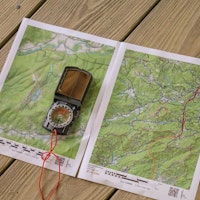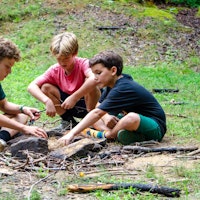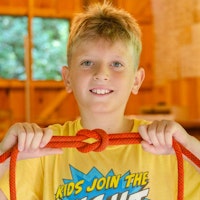Planting the Seed of Discovery
When was the last time you spent the whole day in nature?
Not just a short walk outside or a visit to the park, but the last time you logged off all your devices, turned off your screens, and went outdoors for a full day?

A full day “unplugged” might feel like a rare luxury in today’s world, especially if you live and work in a city. At camp though, this is the daily norm!
We’ve had some on and off rain showers over the past couple of days, but at camp the outdoor fun doesn’t stop just because of a little rain. While “getting some fresh air” may be a task on your daily schedule back home, here we’re surrounded by nature 24/7.
Not only are boys able to spend the summer outside, but they also grow their confidence and nature knowledge with activities like Outdoor Skills or the F.A.R.M.
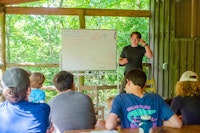
Finding Confidence in the Outdoors
You don’t need to go to the wilderness or find yourself in a survival setting to learn outdoor skills. In fact, we want boys to learn about nature here at camp so they can appreciate it in daily life back home.
It can be hard to appreciate something you don’t understand, so often the first step to feeling comfortable in the outdoors is just learning about it. That’s where the activity “Outdoor Skills” at camp comes in.
During this activity period, boys can learn bushcraft, camping, and outdoor skills to increase their comfort and familiarity in nature. Maybe they’ll be inspired to start their own backyard garden, identify trees and useful plants in their neighborhood, or notice the local birds and wildlife more back home.

Other “outdoor skills” are applicable to a variety of everyday life situations – like knowing how to build a fire or having knot tying skills to secure items.
These are good lifelong skills, not for dire survival situations, but just for every day feeling confident outdoors.
Grace Thomsen, Outdoor Skills Activity Head, Syracuse, NY

The Wonder of Discovery
This week in Outdoor Skills, one of the activities was going on a “foraging hike.” Though we don’t eat anything we find, it’s fun to wander through the woods with a heightened awareness, trying to find hidden mushrooms or discover unique plants.
By intentionally being curious about our surroundings, boys can explore and connect with nature at a slower pace, finding interesting plants and fungi along the way.
“Look! There’s one behind the rhododendron!” pointed Caleb Black, the Outdoor Skills counselor leading one of these foraging hikes. They were looking for chanterelle mushrooms and learning about the fungi found in this area.
A small cluster of gold could be seen peeking out among the leafy green forest floor. Caleb explained what set this unassuming mushroom apart. “See these false gills on the bottom? And when you get up close and smell it, there’s a slight apricot scent.” The boys were fascinated to learn that the forest contained hidden treasures like this.
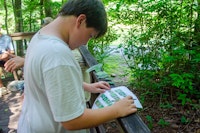
Wells W. said he initially signed up for this activity so he could build fires but became interested in the scavenger-hunt-style foraging hikes. “We don’t see mushrooms at home like this,” he said. “This is the best part,” agreed Army R., excited about finding the next mushroom on the walk.
“Outdoor Skills is a good activity to learn to be more self-sustainable, and to learn about what’s growing around us,” said Caleb. He pointed out some wood sorrel, which is full of Vitamin C and can be used in tea or eaten raw. The boys compared the leaves to nearby clover, which looks similar, but has rounded leaves. Wood sorrel has heart shaped leaves instead.
Using sight, touch, and smell, the boys were able to be immersed in nature in deeper way than if they had just been learning about these plants in a book.
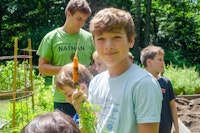
A Sensory Experience
Nearby at the F.A.R.M. activity program, counselor Ben Farmer also likes to teach campers using the five senses. “It’s more memorable to learn about nature with all your senses. The wintergreen smell of birch bark, the lemony taste of sourwood leaves, the root beer smell of sassafras root – those experiences stick with you,” said Ben.
F.A.R.M. stands for Food, Animals, Repurposing, and Manpower – four things that you’ll find at the FARM activity. The boys often get to taste tomatoes, radishes, carrots, strawberries, herbs, and more, all grown in the garden beds here at camp. They can see what it takes to plant, grow, and care for vegetables, from seeds all the way up to harvest time.
Ben was a camper himself and remembers becoming interested in plants while here at camp. He learned more each summer and returned to teach nature and F.A.R.M. as a counselor.
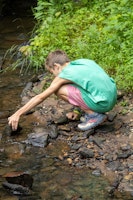
Planting A Seed
While Outdoor Skills and the F.A.R.M. give boys more information about the flora and fauna around them, “nature” isn’t limited to participation in just these activities. You’ll see boys all around camp acting with curiosity and supporting their sense of wonder outdoors. They’re looking under rocks in the creek, catching bugs during free time, finding salamanders on the banks of the lake, and walking along mossy paths to get between activity periods.

Rather than just being a pretty place, the outdoors can start to seem more “alive” and full of wonder the more you become familiar with it.
At camp, a seed gets planted – not just the literal ones in the garden beds – but metaphorical seeds of interest and knowledge about the natural world too. Hopefully these two weeks at camp foster wonder and spark interest, encouraging boys to stay curious about the world and continue exploring.
